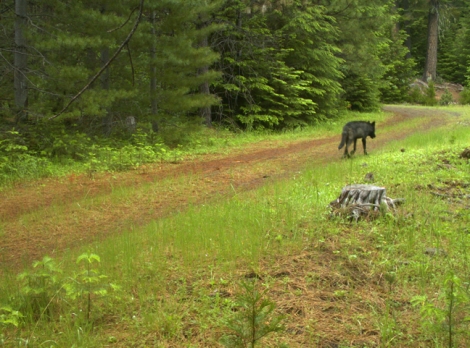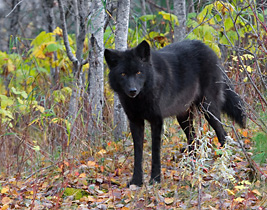
The Ojibwe revere the wolf, the wolf is brother, in their native tongue the wolf is Ma’iingan. The tribes banned all wolf hunting on their reservations. “The snag, though, comes on reservations checkerboarded with non-Native ownership within reservation boundaries since the General Allotment Act of 1887. While virtually all lands within the Red Lake and Grand Portage reservations’ boundaries are held by the tribe or tribal members, others are like Leech Lake and White Earth, where 10 percent or less of lands within reservation boundaries are tribally held.”….Indian Country
Wolves are once again protected in the Great Lakes but politicians, catering to Big Agriculture and hunting interests, are scheming to introduce legislation that would pull an-end-round the courts and delist wolves via Congressional fiat. This move is very similar to the 2011 delisting of wolves in the Northern Rockies, when Montana Senator Jon Tester slipped a wolf delisting rider into a must pass budget bill. Democrat Senate Majority Leader, Harry Reid, refused to pull the rider out of the bill for an up or down vote and it sneakily passed without a whisper. It was an assault on American wolves and the Endangered Species Act.
President Obama signed the bill into law and just like that wolves in the Northern Rockies lost their federal protections. Since then, thousands of wolves have died in wolf hunts, Wildlife Service killings and poaching.
With powerful enemies like that the wolf faces terrible persecution and suffering. This is why I want to personally thank the wonderful Ojibwe who honor Ma’iingan . They proudly stand with their brethren, the wolf. What a remarkable people!
===
Idle No More Duluth Fights to Save Wolf, Ojibwes’ Brother
Idle No More Duluth, based in northern Minnesota, is using the recent federal court ruling that put the gray wolf back on the endangered species list to call for respect by non-Natives of hunting bans enacted on most Minnesota Ojibwe tribal lands.
The December ruling halted wolf hunts, which have taken place in at least six lower 48 states since the gray wolf was delisted from endangered species designation. Minnesota’s first wolf hunt was in 2012.
All of the Ojibwe tribal nations within Minnesota have outlawed hunting or trapping of wolves within their reservation boundaries. The snag, though, comes on reservations checkerboarded with non-Native ownership within reservation boundaries since the General Allotment Act of 1887. While virtually all lands within the Red Lake and Grand Portage reservations’ boundaries are held by the tribe or tribal members, others are like Leech Lake and White Earth, where 10 percent or less of lands within reservation boundaries are tribally held.
So although the tribes have banned wolf hunts within their reservations, the question arises over whether bans can be upheld on non-tribally-held parcels.
In the past, tribal leaders like the chairwomen of the Sandy Lake Band of Mississippi Chippewa and the Fond du Lac Band of Lake Superior Chippewa have emphasized authority within the reservations. “Certainly we’ll be keeping a close eye on all of our borders,” Fond du Lac chairperson Karen Diver toldMinnesota Public Radiobefore the 2012 hunt. “And we are asking non-band member hunters to respect the outer boundaries of the Fond du Lac reservation and not hunt within our borders.”
“In the Native American culture, the wolf is a sacred animal and part of our clan system also,” Sandy Lake Band of Mississippi Chippewa Chairwoman Sandy Skinaway told Martha Fast Horse on her radio show in November, when the hunt was still active. “I believe the wolf is our relative … [it] is a clan animal.”
“Here in Minnesota, the major contention is the statewide wolf hunt prescribed by the state that refuses to acknowledge the territorial jurisdiction of the tribes and the importance of a healthy relationship between Ma’iingan (Wolf) and Anishinaabe,” Ojibwe elder Bob Shimek, Red Lake, wrote in a February 2014 essay, “The Wolf is My Brother! The Cultural, Spiritual and Historic Relationship Between the Ojibwe Anishinaabe and Ma’iingan of the Great Lakes.”
Although the hunt has been stopped for now, the issue will arise again. Congressional moves are already afoot to pass legislation overriding the court ruling. U.S. representatives from Minnesota, Wisconsin, Michigan and Wyoming are all involved in the effort. Idle No More Duluth’s initiative intends to lay the groundwork for respecting tribal boundaries and laws before such moves again change the laws.
“We are trying to normalize the idea of thinking about sovereignty,” said Reyna Crow with Idle No More Duluth. “This is all ceded territory. What could be more culturally significant than Ma’iingan?
Read More:
http://indiancountrytodaymedianetwork.com//2015/02/11/idle-no-more-duluth-fights-save-wolf-ojibwes-brother-159150
===
Article from 2012, when Minnesota instituted wolf hunts against the protest of Native Americans in the state.
Minnesota Ignores Indians, Allows Wolf Hunting
Against the steadfast opposition of American Indians in the state, Minnesota will hold its first managed wolf hunting and trapping season this fall. As a result, a cultural clash is brewing between state officials and Indians, who revere wolves.
“The wolf is part of our creation story, and therefore many Ojibwe have a strong spiritual connection to the wolf,” Karen Diver, chairwoman of the Fond du Lac Band of Lake Superior Chippewa, wrote in a letter to the state Department of Natural Resources (DNR) this spring, according to theStar Tribune. “Many Ojibwe believe the fate of the wolf is closely tied to the fate of all the Ojibwe. For these reasons the Fond du Lac Band feels the hunting and trapping of wolves is inappropriate.”
http://indiancountrytodaymedianetwork.com/2012/07/05/minnesota-ignores-indians-allows-wolf-hunting-121922
===
The Gray Wolf is Once Again a Protected Species
Friday brought 50 shades of good news for the gray wolf and its supporters: the U.S. Fish and Wildlife Service announced they are restoring endangered species protections that had been stripped in previous years for the gray wolf.
The ruling means that it will be illegal to hunt or trap gray wolves in newly re-protected states including northern Iowa, Illinois, Indiana, North and South Dakota and the western Great Lakes area, including Michigan, Minnesota, Wisconsin and Wyoming. There are only an estimated 3,700 gray wolves in the wild today in the Great Lakes region.
“The gray wolf is recovered in less than 10 percent of its historic range and facing continued persecution. The courts got it right: Gray wolves clearly continue to need the protection of the Endangered Species Act,” Noah Greenwald, endangered species director at the Center for Biological Diversity,said in a statement . “We’re glad the U.S. Fish and Wildlife Service today officially acknowledged gray wolves’ endangered status.”
Friday’s decision didn’t happen in a vacuum. 50 scientists signed onto a letter that was sent to Congress this week saying that the wolf population still has not fully recovered and urged congressional action to restore the protections. In recent years, the U.S. House has supported legislation that would strip gray wolves of their protected status. In December, U.S. District Judge Beryl A. Howell overturned the FWS decision, ruling that the lifting of protections placed the wolf populations back in danger of extinction.
The gray wolf used to be a vibrant species all across North America, with an estimated population of 2 million wolves in the U.S. alone before excessive hunting and open extermination efforts nearly wiped out the entire population,leaving only a few small packs left in Michigan and Minnesota. Protecting their population isn’t just good PR, wildlife experts say it’s essential to protecting the entire ecosystem.
Read More:
http://www.ryot.org/gray-wolf-protected-species/922347
===
According to national reports, federal Judge Amy Berman Jackson has kept her ruling and ordered the gray wolf back on the endangered species list, despite Wyoming’s attempts to maintain their current status.
This order will throw out Wyoming’s proposed management plan, reports OIL CITY NEWS .
Some areas will be unaffected by the re-listing of the wolves, including Montana, Idaho, eastern Washington and Oregon, which will be under the guise of state agencies, according to national reports.
Wolves have been off the endangered species list since 2012, meaning in Wyoming they cannot be killed if ranchers are losing cattle because of their nonessential experimental population designation.
http://www.ktvq.com/story/28161865/grey-wolves-return-to-endangered-species-list
===
Gray Wolf again listed as endangered in northern Iowa
AP
Story Created: Feb 21, 2015 at 3:49 PM CDT
Story Updated: Feb 21, 2015 at 3:49 PM CDT
DES MOINES (AP) — Federal protections for gray wolves have been reinstated for the northern half of Iowa and portions of nearby states.
The U.S. District Court for the District of Columbia reinstated federal protections in the western Great Lakes region on Dec. 19. The U.S. Fish and Wildlife Service published its rule on the decision Friday.
The ruling once again classifies gray wolves as endangered in all of Wisconsin and Michigan, the eastern half of North Dakota and South Dakota, the northern half of Iowa, the northern portions of Illinois and Indiana, and the northwestern portion of Ohio. Wolves in Minnesota are once again classified as threatened.
The court decision, the result of a lawsuit filed by the Humane Society of the United States, vacated and set aside a 2011 delisting rule.
http://www.kcrg.com/subject/news/gray-wolf-again-listed-as-endangered-in-northern-iowa-20150221#wdxC08q48yfdQyuh.99
===

Ribble proposes removing gray wolf from endangered species list in Midwest
Posted: Monday, February 16, 2015 9:03 am
By Chuck Quirmbach, Wisconsin Public Radio
U.S. Rep. Reid Ribble, R-Wis., has introduced one of two bills aimed at taking the gray wolf off the endangered species list in parts of the U.S.
Two months ago, a federal judge ordered greater protection for the wolf in the Western Great Lakes region, halting state-sponsored wolf hunting and trapping.
The Humane Society of the United States doesn’t approve of the congressional legislation. State Director Melissa Tedrowe said the measures will do nothing to help the wolf.
“We think that this is an overreach that’s sending us in a very bad direction when it comes to managing wolves,” said Tedrowe. “States have failed so badly in their oversight of the species.”
Read More:
http://www.pricecountydaily.com/news/regional/ribble-proposes-removing-gray-wolf-from-endangered-species-list-in/article_f27809bc-b5ec-11e4-b308-63ebc00772e7.html
===
Top Photo: Courtesy Fanpop
Bottom gif: Courtesy gifdotnet
Middle Photo: Courtesy KTVQ
Bottom Photo: Courtesy Wiki (Symbol of Anishinaabe people)
Posted in: Wolf Wars
Tags: Ojibwe, Ma’iingan, Great Lakes wolves, ESA protections restored, Congress more dirty tricks, wolf revered by Ojibwe














 Boulder White Clouds Council
Boulder White Clouds Council Exposing The Big Game
Exposing The Big Game Footloose Montana
Footloose Montana Friends of the Clearwater
Friends of the Clearwater Lockwood Animal Rescue Center
Lockwood Animal Rescue Center Louise du Toit
Louise du Toit LUPUSLAETUS
LUPUSLAETUS Mercy For Animals
Mercy For Animals Northern Idaho Wolf Alliance (NIWA)
Northern Idaho Wolf Alliance (NIWA) Predator Friendly®- Because Wildlife Matters
Predator Friendly®- Because Wildlife Matters Project Coyote
Project Coyote Project: Wolf
Project: Wolf The Nature Conservancy
The Nature Conservancy The Ravensong Group
The Ravensong Group WildEarth Guardians
WildEarth Guardians Wisconsin Wildlife Ethic-Vote Our Wildlife
Wisconsin Wildlife Ethic-Vote Our Wildlife Wolf And Wildlife Studies: Jay Mallonee (Independent Wolf Biologist)
Wolf And Wildlife Studies: Jay Mallonee (Independent Wolf Biologist) Wolf Song of Alaska
Wolf Song of Alaska Wolves in english ! Les loups en anglais !
Wolves in english ! Les loups en anglais ! WWP's Gray Wolf Page
WWP's Gray Wolf Page Yellowstone To Yukon Conservation Initiative
Yellowstone To Yukon Conservation Initiative